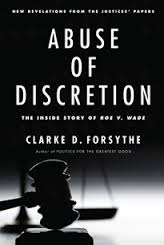 Clarke D. Forsythe, Abuse of Discretion: The Inside Story of Roe v. Wade (New York: Encounter Books, 2013). Hardback / Kindle
Clarke D. Forsythe, Abuse of Discretion: The Inside Story of Roe v. Wade (New York: Encounter Books, 2013). Hardback / Kindle
On January 22, 1973, the Supreme Court of the United States handed down decisions in two abortion-related cases, Roe v. Wade and Doe v. Bolton. The effect of those decisions was immediate and radical. State laws prohibiting or restricting abortion were struck down, and a right to abortion at any time for any reason was established. The United States is now one of only ten nations (out of 195) that permit abortion after 14 weeks, and one of only four that permit it for any reason after viability.
Clarke D. Forsythe argues that the Supreme Court reached the wrong decision in both cases in his new book, Abuse of Discretion. Forsythe is Senior Counsel at Americans United for Life, and this book is the culmination of over 25 years of research into the legal, medical, and political aspects of America’s abortion debate. A unique feature of this book is the extensive use of archival material from the papers of eight of the nine justices who decided the case, some of which has only recently become available to researchers.
Forsythe argues that the Supreme Court’s hearing of Roe and Doe was mistaken from the start. On February 23, 1971, the Court handed down its decision in Younger v. Harris, which limited the power of federal courts to interfere with pending state criminal investigations. The Justices voted to hear Roe and Doe on April 22 in order to determine whether, as a matter of procedure, Younger could be applied to state criminal prosecutions for abortion. The first round of oral arguments took place on December 13, when the Court had two vacancies. A second round occurred on October 11, 1972, after those vacancies had been filled.
Because the question before the Court was procedural, rather than substantive—that is, whether a federal court had the jurisdiction to intervene in state prosecutions for abortion rather than whether abortion was a fundamental right—the cases came before the Justices with no trial or factual records. And most of the oral arguments dealt with jurisdiction rather than rights. Consequently, in deciding the cases, the Justices were flying blind.
This is evident in the majority’s reliance on Cyril Means’ arguments—long since refuted—that abortion was a liberty under English common law, and that growing American restrictions on abortion in the 19th century were meant to protect the mother, not the child in the womb. It is evident in their misconstrual of the common law’s use of “born alive” as a gestational rather than evidentiary term. It is evident in their taking “judicial notice” of factual assertions—questionable even then—about the high death rates involved with illegal “back alley” abortions, and the comparative safety of legal induced abortion to natural childbirth. And it is evident in importance Roe placed on “viability,” even though the concept was absent from the Texas and Georgia laws under consideration, not to mention its absence from any state law at the time.
To put the matter simply, the majority decisions in both cases invented a right to abortion that misconstrued American legal history, rested on unfactual “facts,” and bulldozed the right of the people through their legislative representatives to craft laws according to their fundamental values. The combined decisions of Roe and Doe were more radical than any state laws that had been acted in the late 60s, even the “liberal” ones. It is sometimes thought, on the basis of Roe, that states can limit access to abortion after viability. But the “maternal health” exemption outlined in Doe makes the right to abortion so absolute that even public health requirements for abortion facilities were invalidated by federal courts after 1973. Roe v. Wade and Doe v. Bolton created a constitutionally guaranteed right to a surgical procedure largely free of regulatory oversight. Kermit Gosnell’s abortion clinic—abattoir, really—demonstrates that absent common-sense regulations, “back alley” abortions can move inside otherwise legal clinics.
American society now faces an ongoing “culture war” over abortion that is incapable of legislative resolution, precisely because the Supreme Court has taken the matter out of citizens’ hands. Where the Court has left power in citizens’ hands on other issues, the people have crafted pragmatic, moderating solutions that, while not necessarily satisfying partisans on either side, at least reflect the “vital center” of American opinion. The center does not hold in America because the Supreme Court will not let it.
For exposing the hollow legal reasoning and perverse effects of Roe v. Wade and Doe v. Bolton, Clarke D. Forsythe should be congratulated, and his book widely read.
P.S. If you found my review helpful, please vote “Yes” on my Amazon.com review page.
P.P.S. The Oyez website has the text of the Roe v. Wade and Doe v. Bolton decisions, transcripts of oral decisions, and other interesting stuff.


Reblogged this on RevDorseyross.
Very Good read, it’s very sad about those stats, that we are one of the very few countries that have abortions. Not that I would want this to happen, but is their anyway percentage of how much illegal abortions happen in those countries.